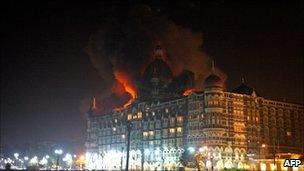Pakistan 'shared Mumbai attacks research with India'
- Published

The cables show concern that militant groups behind the Mumbai attack were still active
Pakistan agreed to share information with India on the 2008 attacks in Mumbai, cables released by Wikileaks have revealed.
The information is contained in a 2009 cable from US Ambassador to Pakistan Anne Patterson.
The agreement followed a secret agreement brokered by the US, and came barely a month after the attacks.
The cables also warns the Lashkar-e-Toiba militant group which carried out the Mumbai attack, could act again.
The leaked cable, sent to Washington on 3 January 2009 by Ms Patterson, showed that barely a month after the 26 November 2008 Mumbai attacks, Pakistan agreed to share information with India on Islamabad's investigation into the gun and grenade strikes.
Ms Patterson wrote said that the director-general of Pakistan's Inter-Services Intelligence (ISI), Lt Gen Ahmad Shuja Pasha, had "just approved the sharing of tearline information on Pakistan's investigation [into the Mumbai attacks] with Indian intelligence, after assurances from the CIA that information would be held in intelligence channels only".
In intelligence parlance, tearline relates to a physical line on an intelligence message which separates categories of information that have been approved for foreign disclosure.
Lashkar-e-Toiba fears
Ms Patterson wanted Washington to ask India not to release information about their investigation into the Mumbai attacks, which might jeopardise the new information-sharing arrangement.
She said if Lt Gen Pasha was "embarrassed by what is essentially public dissemination without the Indians providing the results of their own investigation to Pakistan, it will undercut Pakistan's ability to pursue its investigation, generate a public backlash in Pakistan and could undermine Pasha personally".
Two days after this cable, India handed over material related to the Mumbai investigation to the Pakistani High Commissioner in New Delhi. Information about the attacks was shared subsequently with other countries.
A reference to the "tearline information" to be provided to India appears in another cable sent by Ms Patterson, after a 2 January meeting with Pakistani President Asif Ali Zardari.
"Zardari had been briefed by ISI Director-General, LTG [Lieutenant General] Pasha, on his meeting with DCIA [Director, Central Intelligence Agency] in Washington, and he had concurred in the release of 'tearline' information to be passed to the Indians," the 5 January 2009 cable said.
In her earlier cable, Patterson had said it would be premature for India to release information about the investigation into the Mumbai strikes until the probe was over.
"We note that the FBI has just presented a long list of information it is still seeking from the Indians to advance its own investigation," she argued in her cable.
Most important, in her view, was that "sleeper cells" of the Lashkar-e-Toiba (LeT), the group responsible for the Mumbai attacks, were still active in India, Nepal, Bangladesh and Pakistan.
"To prevent another potential attack, we need to keep channels of co-operation and information sharing open…our goal is not only to bring the perpetrators of this [Mumbai] attack to justice, but also to begin a dialogue that will reduce tensions between India and Pakistan," she said.